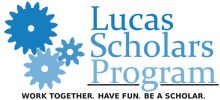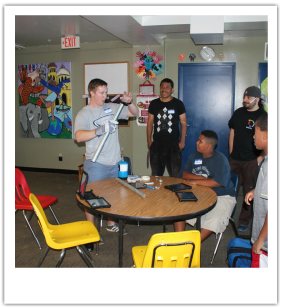We had our very first meeting at the Boys and Girls Club on Friday, July 12th. Our team included John Umekubo (Technology Director), Manny Quintero (Technology Associate), Vanessa Gatewood (Development and newly appointed Diversity Coordinator) and Ross Cowman (Science Teacher). You can read even more about these fabulous folks in our Faculty section of the website. We arrived at BGVC around 3:30 to get set up for our 4:00 pm meeting time with the students, which was to be followed by a 5:00 meeting with parents. We had a few parents show up around 3:45 pm to meet us. We originally planned on meeting them after working with the students for an hour, but there they were so we begin talking about the program even before we met any students. Thinking back, maybe that was superior to our original plan anyway. At 4:00 pm, we met 11 of our potential students, and about the same number of parents trickled in. Some of the parents said they had kids in the program, but the student couldn’t make this meeting. According to Valentin, he does have the full 20 student roster, including names on a wait list, so we are hoping by the time the program starts in two weeks we will be completely full. We really tried to set our sights to a fairly manageable number in our first year.
We began by introducing ourselves, the program, and talking about our Lucas Scholars motto: "Work Together. Have Fun. Be a Scholar". Then, we broke out into small groups with several students and a teacher. We asked the students questions like: “Why do you want to learn about science and technology?” and “If you could invent one thing, what would it be?”, then students went into an “interview room” to give their responses to the iPad camera. We were going to show this footage of the students to parents at the meeting, but time got away from us. Instead, we will likely use this footage on the website and/or at graduation. You can never have too much documentation in this instance!
After their interviews, we used the iPads. We had them open an app called “Socrative” which is an interactive response system. Students progressed through a teacher led questionnaire and their answers showed up on the board. We then discussed the answers as a group as we moved through the questions. It was all a little goofy, with questions like “Would your rather be a tiny rhino or a giant hamster?”, but also had some questions that sparked lively discussion like “Would you rather get even or get over it?”. It was fun for the students and parents to see their responses on the board in bar graph form.
From there, I had the students fill out a short initial assessment of their knowledge about iPads and our subject matter for the summer, waves. I am hoping this assessment will yield valuable data for comparison.
It was time to get the group moving again, so we started talking about energy and waves. I showed the movement of energy through solids with a marble demonstration, as you can see in this video:
We began by introducing ourselves, the program, and talking about our Lucas Scholars motto: "Work Together. Have Fun. Be a Scholar". Then, we broke out into small groups with several students and a teacher. We asked the students questions like: “Why do you want to learn about science and technology?” and “If you could invent one thing, what would it be?”, then students went into an “interview room” to give their responses to the iPad camera. We were going to show this footage of the students to parents at the meeting, but time got away from us. Instead, we will likely use this footage on the website and/or at graduation. You can never have too much documentation in this instance!
After their interviews, we used the iPads. We had them open an app called “Socrative” which is an interactive response system. Students progressed through a teacher led questionnaire and their answers showed up on the board. We then discussed the answers as a group as we moved through the questions. It was all a little goofy, with questions like “Would your rather be a tiny rhino or a giant hamster?”, but also had some questions that sparked lively discussion like “Would you rather get even or get over it?”. It was fun for the students and parents to see their responses on the board in bar graph form.
From there, I had the students fill out a short initial assessment of their knowledge about iPads and our subject matter for the summer, waves. I am hoping this assessment will yield valuable data for comparison.
It was time to get the group moving again, so we started talking about energy and waves. I showed the movement of energy through solids with a marble demonstration, as you can see in this video:
With that bit of background information, we introduced them to three different learning stations. The first was a laser challenge, where students had to arrange a series of mirrors in order to make the laser beam hit the target (light waves). They really seemed to enjoy this one and John led them through the activity in an enthusiastic way. The next table was a sound waves station with four or five iPad minis and headphones. Students were instructed to open the app “Exploratorium: Sound”, and work their way through the app. This is a truly engaging application that operates a bit like an interactive book with each chapter having a certain theme. One chapter is “How Old Are Your Ears?” where students could compare the frequencies of sound they can hear versus their parents’. There is a significant difference! As we age, we lose the ability to hear higher frequencies. The last station was by far the most popular because it involved fire. Leave it to the most experienced science teacher, Bruce, to find this great activity called “Singing Pipes”. He couldn’t be there on Friday, but demonstrated it to us before he left so the youthful and dynamic Ross could show the students. Basically, you heat up a metal pipe stuffed with wire mesh with a propane torch. Then, hold the pipe perpendicular to the ground and it will “sing”, really more like a moaning wail. When you hold the pipe parallel to the ground it stops making the sound because the hot air is no longer going up through the top. Check out this link from Steve Spangler to hear the pipes sing away: http://www.stevespanglerscience.com/lab/experiments/singing-pipes
After the stations were done, parents and students started to filter out, saying thank you, goodbye and asking any remaining questions. I can’t emphasize enough how energizing it was to meet these kids, parents, and seeing our Lucas Scholars team in action. I think we all walked away with new knowledge, experience, and genuine excitement for the week to come. Only 12 more days until we're rolling!
After the stations were done, parents and students started to filter out, saying thank you, goodbye and asking any remaining questions. I can’t emphasize enough how energizing it was to meet these kids, parents, and seeing our Lucas Scholars team in action. I think we all walked away with new knowledge, experience, and genuine excitement for the week to come. Only 12 more days until we're rolling!


 RSS Feed
RSS Feed
